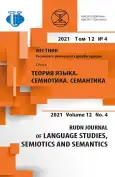Evolution of the Associative-Verbal Network of the Concept “Old Age” in the Language Consciousness of the Native Russian-Language Speakers of the 20s of the XXI Century
- Authors: Safaralieva L.A.1
-
Affiliations:
- Peoples’ Friendship University of Russia (RUDN University)
- Issue: Vol 12, No 4 (2021)
- Pages: 1147-1159
- Section: COGNITIVE RESEARCH
- URL: https://journal-vniispk.ru/2313-2299/article/view/323338
- DOI: https://doi.org/10.22363/2313-2299-2021-12-4-1147-1159
- ID: 323338
Cite item
Full Text
Abstract
The development of information technologies, change of political system and other socio-political changes in the life of any state, leave an imprint on the linguistic consciousness of a typical native speaker. Notwithstanding, the national conceptual sphere or “naïve” linguistic picture of the world has undergone significant changes, for all the changes in the world around us are fragmentally recorded in the collective linguistic consciousness of Russian language native speakers. The concepts of “old age” that were relevant to the residents of our state three decades ago, have undergone significant changes. Negative attitude to the old age, pessimism, and a sense of the inevitable end of life, have been replaced by the hope of a “prosperous, happy, financially stable old age”. The younger generation does not hesitate to draw a parallel between such concepts as “old age” and “retirement” - this fact was recorded for the first time as previously, the scientific studies based on data from associative experiments, hadn’t noted similar approach. The above conclusions were obtained as a result of a chain associative experiment with the word-stimulus “old age”, which involves obtaining 3 reactions of students to this stimulus (on the basis of the Faculty of Philology of the RUDN). 99 students (aged 17-25), native speakers of the Russian language, were selected to participate in the experiment (these parameters are reflected in the questionnaire of the subjects). Due to the unfavorable epidemiological situation and the conditions of distance learning, the experiment was conducted in an online format using the MS Forms application. The obtained resulting associative-verbal network of the concept “old age” was compared with the characteristics of the above-mentioned concept, recorded in the Associative Dictionary of the Russian Language edited by Yuri Nikolaevich Karaulov.
About the authors
Lubov’ A. Safaralieva
Peoples’ Friendship University of Russia (RUDN University)
Author for correspondence.
Email: kuznetsova-la@rudn.ru
Assistant Professor at the Department of General and Russian Linguistics, Faculty of Philology
6, Miklukho-Maklay Str., Moscow, Russian Federation, 117198References
- [Electronic resource]. Aspects of old age URL: https://seni.ru/ru_RU/content/aspiekt-starosti (accessed: 11.01.2021). (In Russ.).
- Kudryashova, Y.S. (2018). The concept of “old age” in Russian and English linguosociums (based on the material of paremiological units). Ogarev-Online, 7 (112). URL: https://cyberleninka.ru/article/n/kontsept-starost-v-russkom-i-angliyskom-lingvosotsiumah-na-materiale-paremiologicheskih-edinits (accessed: 18.01.2021). (In Russ.).
- Stepanov, Y.S. (2001). Constants: Dictionary of Russian Culture (Text) Moscow: Akademichskij proekt. (In Russ.).
- Markelova, T.V., & Novikova, M.L. (2021). «Health — Disease» Conceptual Sphere: Cultural Code. RUDN Journal of Language Studies, Semiotics and Semantics, 12(3), 848—874. doi: 10.22363/2313-2299-2021-12-3-848-874 (In Russ.).
- Wei, Ye & Ni’ao, Deng (2020). Claiming and displaying national identity: A case study of Chinese exchange students in Russia. Training, Language and Culture, 4(3), 43—54. doi: 10.22363/2521-442X-2020-4-3-43-54 (In Russ.).
- Denisenko, V.N. (2004). Concept change in the Russian language picture of the world: Monograph. Moscow: RUDN Publishing House. (In Russ.).
- Chulkina, N.L. (2015). Language World Picture and National Concept Sphere: Ontology, Methods of Reconstruction and Unit Description. RUDN Journal of Language Studies, Semiotics and Semantics, 1, 76—82. (In Russ.).
- Ozhegov, S.I. Explanatory dictionary of the Russian language: online version. URL: https://slovarozhegova.ru/word.php?wordid=30422 (accessed: 30.01.2021). (In Russ.).
- Babenko, L.G. (2011). Dictionary of synonyms of the Russian language. Moscow: Astrel, AST. (In Russ.).
- Alexandrova, Z.E. (2001). Dictionary of synonyms of the Russian language: A practical reference. Moscow: Russkij jazyk. (In Russ.).
- Kryuchkova, N.V. (2006). The specifics of the manifestation of conceptual features in the lexical system of the language and in associative relations. Vestnik TSPU, 5(56), 75—79. (In Russ.).
- Evseeva, O.V. (2009). Associative experiment as a research procedure in psycholinguistics. Vestnik SUSU, 2(8), 82—84. (In Russ.).
- Ufimtseva, N.V. (2014). Associative dictionary as a model of the linguistic picture of the world. Vestnik IrSTU, 9, 340—346. (In Russ.).
- Blinova, I.S. (2009). Ethnocultural specificity of the concept “old age” (based on the material of the Russian and German languages). Izvestiya VSPU, 5. URL: https://cyberleninka.ru/ article/n/etnokulturnaya-spetsifika-kontsepta-starost-namateriale-russkogo-i-nemetskogo-yazykov (accessed: 16.01.2021). (In Russ.).
- Karaulov, Yu.N. (2002). Russian associative dictionary. Moscow: Astrel. (In Russ.).
- Gorinova, N.S. (2009). Associative experiment as a way of studying language consciousness // Almanac of modern science and education, 8(27—2), 52—53. (In Russ.).
- Karaulov, Yu.N., Sorokin, Yu.A., Tarasov, E.F., Ufimtseva, N.V. & Cherkasova, G.A. (1994, 1996, 1998). Russian associative dictionary. Associative thesaurus of the modern Russian language. In 3 parts, 6 books. Books 1, 3, 5. Direct dictionary: from stimulus to reaction. Book 2, 4, 6. Reverse dictionary: from reaction to stimulus. Moscow. [Electronic resource]. URL: http://tesaurus.ru/dict/ (accessed: 14.01.2021). (In Russ.).
Supplementary files









